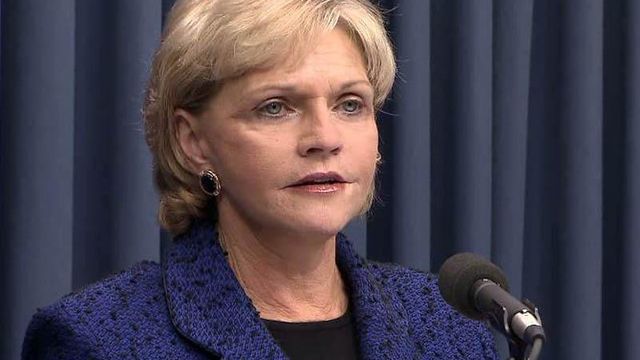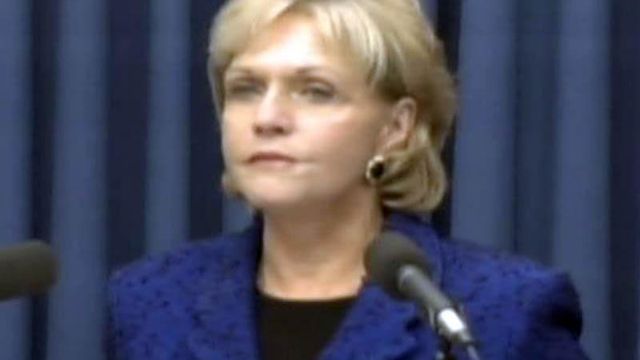Perdue outlines cuts, keeps most of temporary sales tax in place
Most of a temporary increase to North Carolina's sales tax rate would remain in place, state parks and welcome centers would close two days a week and about 10,000 government jobs would be eliminated under a two-year spending plan outlined Thursday by Gov. Beverly Perdue.
Posted — UpdatedWith fiscal analysts projecting a $2.4 billion deficit for the fiscal year that starts in July, Perdue's $19.9 billion budget for the 2011-12 year is only about $1 billion less than the budget she proposed two years ago. She said she balanced the budget through 72 percent spending cuts and 28 percent revenue growth.
"This budget does none of the smoke and mirrors," she said, noting she wants to ensure that recurring expenses are paid with recurring revenue and not through "accounting tricks."
Some of the state revenue would continue to be generated by a sales tax increase that lawmakers approved two years ago. The penny increase is scheduled to expire this year, but Perdue's budget plan would roll it back by only a quarter-cent. That means the state tax rate would be 5.5 percent – down from the 5.75 percent now collected but higher than the 4.75 percent that would be collected if the tax were to expire.
The governor previously said she would allow the tax to end this year. A surcharge on income taxes for upper-bracket earners would expire as scheduled under Perdue's budget.
As promised Monday in her State of the State address, Perdue also wants to cut the state corporate income tax rate from 6.9 percent – among the highest in the Southeast – to 4.9 percent – among the lowest in the nation.
She said Thursday that the move would save corporations and small businesses about $500 million while creating about 10,000 jobs over the next three years.
One potential source of revenue that the governor backed away from was regulating and taxing Internet sweepstakes games. Lawmakers banned the games last year, but some remain in operation because of a court ruling.
An analysis by the North Carolina Education Lottery said legalizing the games could generate about $500 million a year.
"I didn't want the next six months, quite frankly, when so much is at stake for North Carolina and our future ... to be distracted by the philosophical and moral debate over gambling and over video poker or lottery," Perdue said.
Teaching jobs protected, others eliminated
To save money, Perdue proposed consolidating 14 state agencies into eight, eliminating many back-office functions she says are redundant. Altogether, her budget calls for eliminating 10,000 state jobs, but State Budget Director Charlie Perusse said only about 3,000 are now filled.
Perdue said she expects more than 1,000 state workers will accept an early buyout provision included in her budget. The plan calls for giving those eligible for retirement an extra $10,000 payout, while younger workers who would retire with reduced benefits would get a $20,000 payout.
"I don't sleep well at night worried about (state employees), but at the end of the day, I do know, quite frankly as the governor, that this is the right decision as we move forward with a leaner state government," she said. "It's what we've got to do – do more with less."
Dana Cope, executive director of the State Employees Association of North Carolina, derided Perdue's budget priorities.
"The governor is advocating for more money from working people in the state of North Carolina, offering less services, so she can give it to wealthy corporations. That is a mixture for disaster," Cope said. "I think the governor's proposal puts North Carolina in a race for the bottom."
The governor said her spending plan protects every state-funded teaching position in North Carolina, but the budget also would eliminate about 4,000 clerical, custodial, transportation and administrative jobs in public schools. She also wants to cut funding for textbooks by about one-third.
Public education spending would be cut by about 4 percent under her budget.
The budget also sets aside $41 million for enrollment growth at community colleges and the University of North Carolina system, although both the UNC system and the Community College System would have to cut their budgets by 8 percent.
The 0.75-cent sales tax that she wants to retain would pay for about 3,400 teachers and 9,000 teaching assistants, Perdue said.
"We've understood for nearly 100 years in North Carolina that education is fundamental to the future welfare of this state," she said.
The consolidation effort would eliminate 68 programs that she says aren't part of the state's core services or have outlived their usefulness. Those moves would save $142 million but would cost 235 jobs. Another 71 programs would be reduced in size, eliminating 5,000 positions and saving $442 million.
State agencies would see cuts of 7 to 15 percent, and the cuts include closing the nine welcome centers at North Carolina's borders on Tuesdays and Wednesdays, and state parks also will close two days each week. The state Department of Transportation and Department of Commerce will begin privatizing the welcome centers next year, according to the budget proposal.
Perdue also wants to set aside $25 million as incentives for counties, cities and state agencies to find ways to consolidate their services to save money.
State lawmakers last week passed legislation that would hold money back from several economic development funds this year. Although Perdue has spoken out against the move, she includes taking $7 million from the Job Development Investment Grant program to help balance the budget.
Funding for the North Carolina Biotechnology Center, the Rural Economic Development Center, the e-NC fund to expand high-speed Internet access and other economic development funds also would be cut by 10 percent under Perdue's budget.
She said she has no plans to touch the Golden LEAF fund, which uses money from a nationwide tobacco settlement to finance economic development projects.
Some costs would be shifted from the state to North Carolina counties under her proposal, such as buying school buses and paying for worker's compensation.
GOP wants more cuts
Leaders of the Republican majority in General Assembly will examine Perdue's plan as they create their own budget.
They quickly panned her decision to keep much of the temporary sales tax in her budget, saying she had promised to let it expire. House Speaker Thom Tillis said, however, that he and other Republicans were encouraged by Perdue's budget-cutting efforts that managed to protect public education as much as possible.
"Where we fall short, we think in our analysis, is about a $1 billion gap," Tillis said, referring to about $800 million from the sales tax and close to $200 million in costs shifted to counties. "We think, in these times, it's very difficult to put that burden on the counties without some sort of a transition."
Senate President Pro Tempore Phil Berger called Perdue's moves tax increases.
"The people understand what we need to do is cut spending," Berger said. "We intend to balance the budget without raising taxes."
They called for Perdue to sign the legislation to withhold money from the economic development funds, saying that would provide another $300 million to state operations.
Tillis also said he doesn't think state layoffs will have a major impact on services provided to the public.
"I think how most people interact with government will remain largely the same. We just think leaner and right-sized," he said.
Republican legislative leaders have said they plan to deliver a budget to Perdue's desk before July 1, when the new fiscal year starts.
• Credits
Copyright 2024 by WRAL.com and the Associated Press. All rights reserved. This material may not be published, broadcast, rewritten or redistributed.






